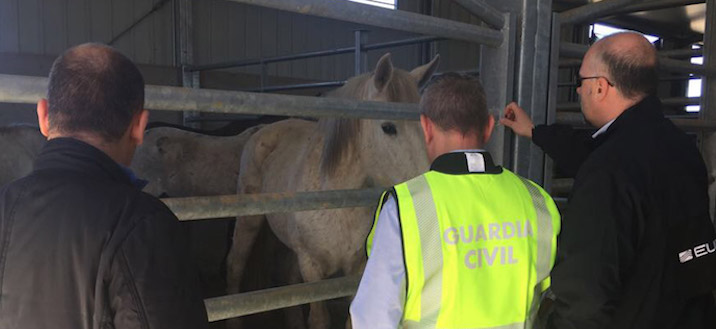The Spanish police have made 65 arrests as part of a major operation they believe has ‘dismantled’ an organised crime group at the heart of the horsemeat scandal.
Those arrested have been charged with various crimes, including animal abuse, document forgery, perverting the course of justice, crimes against public health, money laundering and being part of a criminal organisation.
The operation was carried out by Spanish, in coordination Interpol and Belgium, France, Italy, Portugal, Romania, Switzerland and the UK.
It dates back to the 2013 horesemeat scandal, which started when the Irish food safety authorities detected beefburgers from Tesco stores containing horsemeat. Meat companies, frozen food companies and fast-food companies were affected by the investigation, which led to the identification of a Dutch citizen known in the horsemeat world, although his whereabouts were unknown at the time
In the summer of 2016, the Spanish Guardia Civil’s Environmental Protection Service initiated Operation Gazel after unusual behaviour was detected in horsemeat markets. They detected a scam whereby horses in bad shape, too old or simply labelled as ‘not suitable for consumption’ were being slaughtered in two different slaughterhouses.
The animals came from Portugal and several places in northern Spain, their meat was processed in a specific facility and from there it was sent to Belgium, one of the biggest horsemeat exporters in the EU. The criminal organisation forged the animals’ identification by modifying their microchips and documentation.
During the investigation, Guardia Civil was able to locate the Dutch businessman related to the Irish case of the beefburgers containing horse meat, in Calpe, Alicante. From there he led the activities of the organisation, putting his most trusted men in charge in every country affected by the scam.
Investigators concluded that the Spanish element of this organisation was a small part of the whole European structure controlled by the Dutch suspect. The arrest of the leader of the criminal group was carried out in Belgium. Different police actions were simultaneously carried out in France, Portugal, Italy, Romania, Switzerland and the UK.
In total, 66 individuals were arrested or investigated and several bank accounts and properties were blocked or seized, and five luxury cars seized.
During the searches at the slaughterhouses and facilities, several samples were taken. The results concluded that the destination of the horsemeat was mainly outside of Spain, due to the fact that the samples in Spain matched those found abroad.
Because of the international nature of this case, Guardia Civil asked Europol has been heavily involved in co-ordinating the operation.




